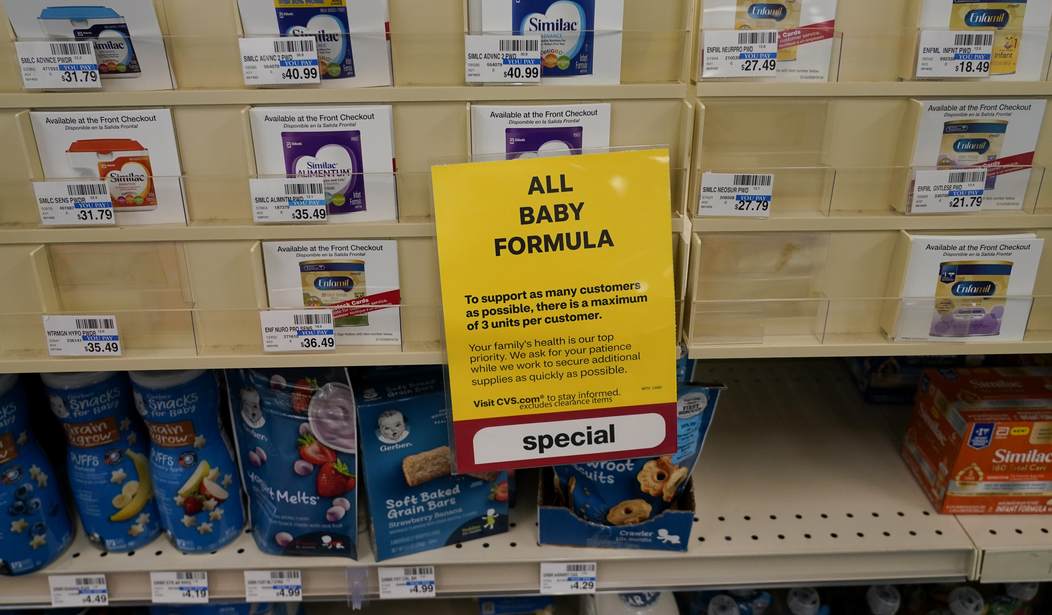The U.S. Food and Drug Administration (FDA) sent warning letters to three infant formula manufacturers Wednesday. This was a part of its regulatory oversight to monitor that the industry is producing infant formula under the safest conditions possible.
The FDA sent letters to ByHeart, Mead Johnson Nutrition (Reckitt), and Perrigo Wisconsin, LLC. They were warned of violations of the Federal Food, Drug, and Cosmetic Act (FD&C Act) and the FDA’s Infant Formula regulations. These reflect findings from the facilities over the last several months. During the inspections, the FDA issued observations and exercised oversight of each manufacturer as they initiated recalls. The recalls happened in December 2022, February 2023, and March 2023. The infant formula products were potentially contaminated with Cronobacter sakazakii.
The FDA issued a statement.
“The FDA is committed to identifying and acting on issues early to prevent any firms from reaching the level of concern that prompted last year’s large-scale recall and contributed to the infant formula shortage,” Donald Prater, acting director of the FDA’s Center for Food Safety and Applied Nutrition, said in a statement.
If it feels like we’ve been here before, it’s because we have. Biden’s America sometimes looks like a Third World country and that was certainly the case when there was a baby formula shortage during 2022. Part of that bang-up job Mayor Pete did with supply chain woes during the pandemic (sarcasm) was addressing getting baby formula on retailers’ shelves. A baby formula shortage in the United States? It was unimaginable before then, but it happened. Imagine being a young mom going from store to store trying to find the baby formula her baby consumes. Abbott recalled various lots of three popular powdered infant formulas in mid-February 2022.
The shortage happened when bacteria contaminated baby formula during the manufacturing process and a nationwide recall was put in place. Plus, there was only one major manufacturer in the country, Abbott, so options were limited. At that time, four babies were hospitalized and two later died. Infant formula manufacturer Abbott didn’t maintain clean surfaces used in producing and handling the powdered formula. The babies contracted rare bacterial infections, Cronobacter sakazakii. It is a common bacteria that poses higher risks to very young babies.
When the news of the baby formula broke, the slow and inept response from the Biden administration was obvious. There were warning signs before the nationwide recall yet the administration made no attempts to find other sources. The Biden administration is reactive, not proactive. There has to have been administration staff who had babies at home and noticed a dwindling of formula on store shelves. Yet, the situation got to the point where one day all of a sudden the headlines were of baby formula shortages and everyone panicked, as you would expect.
So now the FDA doesn’t want to look flat-footed again and wants to appear to be on it, doing inspections and providing oversight. However, why was the press release made Wednesday when the inspections that produced concern over contamination happened back in December 2022, February 2023, and March 2023? The main problem last time around was that the FDA shut down the Abbott plant without foresight to where baby formula would come from without the major manufacturer online. Obviously the supply of baby formula dried up. There was not fresh supplies to order when stores needed to re-stock.
From the FDA’s press release:
Importantly, the FDA does not advise parents and caregivers to discard or avoid purchasing any particular infant formula at this time. The agency is not aware of any distributed product where contamination was confirmed and believes that the recalls were effective in removing the potentially contaminated batches of product from the market. Additionally, these warning letters are not associated with any current recalls and therefore the FDA does not anticipate any impact to the availability of infant formula on the market.
The FDA is issuing these letters now as part of its normal regulatory process and to reinforce to these firms the importance of instituting and maintaining appropriate corrective actions when they detect pathogens to ensure compliance with the FDA’s laws and regulations. As part of this, the firms must, among other things, thoroughly conduct root cause investigations and perform subsequent cleaning and sanitation activities. Notably, firms also need to properly evaluate their cleaning and sanitation practices, schedules, and procedures before releasing product. Each company will have 15 working days to respond to the FDA to explain what corrective actions they are taking. The FDA will assess the adequacy of the companies’ corrective actions in the agency’s review of the responses and during the FDA’s next inspection of each facility. During these inspections the agency will verify proper implementation of appropriate corrective actions taken by each company.
“Infant formula manufacturers are responsible for ensuring they make safe products, and the agency has remained in ongoing discussions with the infant formula industry to address the agency’s concerns. The FDA is committed to identifying and acting on issues early to prevent any firms from reaching the level of concern that prompted last year’s large-scale recall and contributed to the infant formula shortage,” said Donald Prater, acting director of the FDA’s Center for Food Safety and Applied Nutrition. “Over the last year the FDA has continued to increase our oversight of powdered infant formula facilities. These letters are a reflection of this enhanced oversight and are intended to help the industry continuously improve the safety of their manufacturing practices, so that parents and caregivers can be confident that the formula they feed their children is safe and nutritious.”
The FDA doesn’t want to be held responsible for parents tossing out potentially contaminated baby formula now. The agency wants credit for its recall taking products off the shelves, though. There are no current recalls. The FDA wants Americans to know that it is working with Congress to strengthen regulations. It is working to increase funding to monitor the industry and is working with CDC to “support the Council of State and Territorial Epidemiologists decision to add invasive Cronobacter infections among infants under one year of age to the Nationally Notifiable Conditions List.” And FDA is hiring more staff to specifically be infant formula investigators and an Office of Critical Foods. Good Lord. Democrats grow bureaucracy and throw taxpayer money at problems as solutions for basic neglect and incompetency of the staff already in place. Piling on more regulations and more staff just sounds like increasing the problem. YMMV. How did infant formula suddenly become contaminated when in years past, this wasn’t a problem? Are plant employees suddenly just not cleaning surfaces as before? It’s just craziness.
When ByHeart learned that a batch of formula had tested positive for cronobacter, an internal investigation said an outside lab was the source of the contamination, according to the FDA’s warning letter. But when the lab’s own review found that a lab error wasn’t the root cause of the contamination, no further investigation was done. ByHeart didn’t immediately respond to a request for comment.
The FDA urged the formula makers to take more action to ensure that conditions within the facilities producing the formula aren’t causing contamination.
In its letter to Reckitt/Mead, which makes Enfamil, the FDA said that the company determined that a base powder made by another manufacturer was the source of a positive cronobacter test, but that the company didn’t consider other possible sources of contamination, including multiple water leaks or piles of spilled infant formula at its facility. Wet conditions can fuel the growth of cronobacter.
Retrain employees on the proper way to maintain a clean workspace. Keep surfaces dry. Don’t allow the bacteria to grow. And, most of all, keep everything running smoothly so that American parents don’t have to scramble just to find baby formula again.








Join the conversation as a VIP Member